The world increasingly needs clean and renewable energy to strengthen our energy security and, most importantly, to combat climate change.
Floods and forest fires in Brazil, record temperatures in the United Kingdom— the impacts of climate change are becoming more evident. To tackle this challenge, we need a global transition to clean energy sources.
This is a great opportunity—a chance to boost economic growth, create quality jobs, and foster greater stability, both nationally and internationally.
The investment opportunities are also enormous, representing nearly USD 7 trillion (BRL 40 trillion) for the global economy. This journey involves a wide range of technologies: wind turbines and solar panels harnessing wind and solar energy; carbon capture, storage, and utilization; clean hydrogen; and sustainable biofuels that decarbonize sectors like transportation, including aviation.
In the UK, we are committed to achieving a clean energy system by 2030. That’s why we created Great British Energy, a public British company that invests in clean energy, accelerating renewable energy investment and removing unnecessary barriers to vital energy infrastructure.
In Brazil, with approximately 90% of our electricity matrix being clean and sustainable and 50% of our total energy matrix renewable—far above the global average—we still have much room for progress. We recently launched a project called Fuel of the Future to accelerate the use of sustainable fuels in aviation and machinery, advance ethanol blending with fossil fuels, and adopt hybrid vehicles powered by electricity and biofuels.
We take pride in standing together as leaders in the fight against climate change. But the reality is that the world is off track to meet its climate targets. We must limit global temperature increases to a maximum of 1.5°C. To achieve this, we aim to drive progress in three key areas.
First, we need to be bold. Both Brazil and the UK announced new Nationally Determined Contributions (NDCs) at COP29 in Baku this month, setting ambitious goals to reduce greenhouse gas emissions. We strongly encourage other countries—particularly G20 economies, responsible for around 80% of global emissions—to make the necessary cuts to get the world back on track.
Second, we need financing. Currently, emerging markets and developing economies receive only 15% of clean energy investments. The International Energy Agency estimates this figure must increase sixfold by the early 2030s. Brazil is leading the way with its new investment platform to mobilize much greater private capital flows into its climate transition projects. We want to help others follow this model and significantly increase private sector investment by connecting investors with major sustainable projects worldwide.
Third, we need alliances. Like-minded countries working together towards a common goal can achieve great things. On Monday (18th), Brazil spearheaded the creation of a new Global Alliance Against Hunger and Poverty, which will pool resources, public policies, and new technologies to help the world’s most vulnerable. The UK was one of the first countries to join this initiative.
And on Tuesday (19th), we jointly launched a new Global Clean Energy Alliance, bringing together various countries—developed and developing, from the North and South—around a clear objective: to help triple renewable energy production capacity and double energy efficiency by 2030, as outlined in the Global Stocktake, the UN’s global progress review under the Paris Agreement.
The alliance will focus on specific missions, starting with removing barriers to financing.
We will support initiatives to enable developing countries to secure the investment needed to meet their climate goals. We will also provide technical support to help them develop a range of projects that can attract private financing, creating quality jobs, fostering growth and prosperity, and reducing carbon emissions.
Both the Global Clean Energy Alliance and the Global Alliance Against Hunger and Poverty will continue to grow and develop. We are proud to have taken these first steps together during the G20 Leaders’ Summit in Rio de Janeiro this week. It is a sign of the strengthening ties between our two countries.
Next year, we will celebrate 200 years of diplomatic relations between the United Kingdom and Brazil. This will be a moment not only to celebrate but also to deepen our cooperation further.
After all, we Brazilians and Britons share many things—not just our love for football but also our determination to improve workers’ lives and tackle the global challenges that increasingly affect us all.
This spirit has driven the steps we’ve taken this week, and it will fuel our ambition to work ever more closely in the future.


